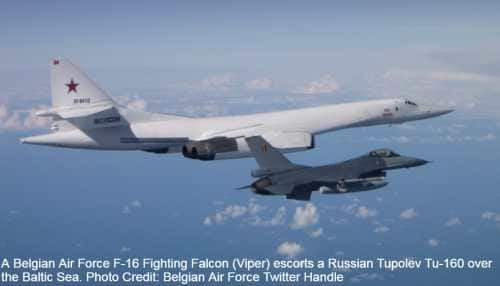- News>
- World
Russia`s Sukhoi Su-27s, Tupolev Tu-160s intercepted by Belgian, Danish, Polish F-16s, Finnish F/A-18C Hornet, Swedish JAS 39 Gripen over Baltic Sea

The F-16s of the Belgian Air Force took off from Lithuania`s Siauliai Air Base where they are currently based as part of NATO Baltic Air Patrol mission. The two Russian Tupolev Tu-160 Blackjack nuclear bombers and two Sukhoi Su-27 aircraft were flying over the Baltic Sea.
A large fleet of F-16 Fighting Falcons (Vipers), F/A-18C Hornet and JAS 39 Gripen fighters were scrambled on Tuesday by the Belgian, Danish, Polish, Finnish and Swedish air forces to track and intercept two Russian Tupolev Tu-160 Blackjack nuclear bombers and two Sukhoi Su-27 aircraft flying over the Baltic Sea. While the air forces of Belgium, Denmark and Poland sent their F-16s, Finland and Sweden called in their F/A-18C Hornet and JAS 39 Gripen for the mission.
The F-16s of the Belgian Air Force took off from Lithuania's Siauliai Air Base where they are currently based as part of NATO Baltic Air Patrol mission. It was the first time that Belgium had sent in its F-16s to intercept Russian military and combat aircraft ever since it started its Baltic Air Patrol mission on September 3, 2019, by basing four Fight Falcons which are also known as Vipers. Before Belgium, its was the turn of Hungary, Spain and the United Kingdom to provide their combat aircraft for NATO Baltic Air Patrol mission.
The Belgian Air Force also tweeted photos of its F-16s escorting the Russian Tu-160s. " #F16 of #NATO's #BAP mission intercepted two Russian #TU160 Blackjack and two Russian #SU27 Flanker above the Baltic Sea. It was the first scramble for the Belgian detachment which is safeguarding the Baltic airspace since the 3th of september. #WeareNATO," the first tweet read.
In the second tweet, the air force gave some information about the Tu-160s. "#DYK The Tupolev #TU160 Blackjack is a nuclear capable supersonic strategic bomber. It has a range of 12300 km and a maximum speed of twice the speed of sound. #NATO #BAP."
According to the Russian Defense Ministry, the Tupolev Tu-160s were on a routine patrol flight performing over the Baltic Sea when the fighter jets of above-mentioned five countries intercepted them at different locations. But the Tu-160s accompanied by two Su-27 fighters continued to perform their scheduled seven-hour flight over what Russia claimed was neutral water of the Baltic Sea.
United Kingdom's Royal Air Force, too, had been kept busy by the Russian combat aircraft while the former had deployed its Eurofighter Typhoon fighters as part of Operation AZOTIZE in Estonia in support of Baltic Air Policing. The Eurofighter Typhoons were launched at least 17 times during their deployment period to track and escort Russian bombers and fighters.
